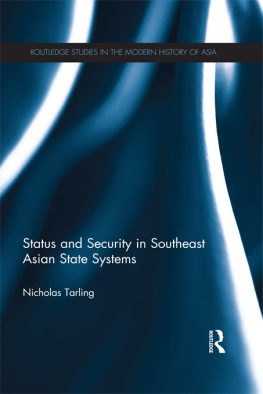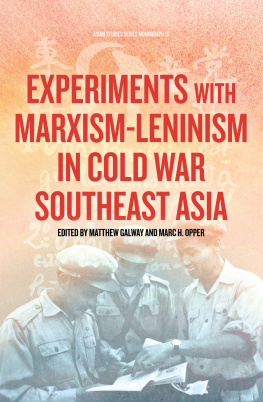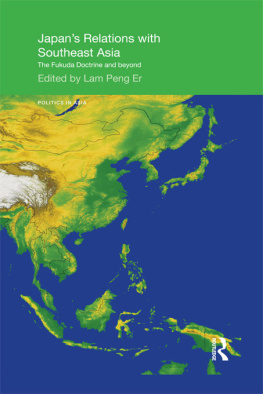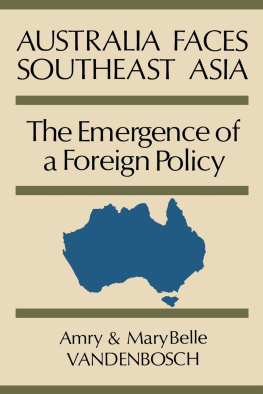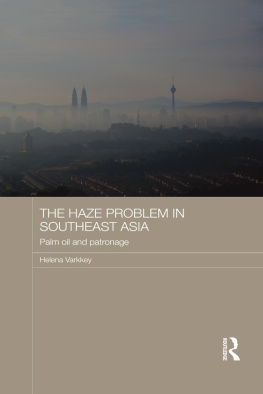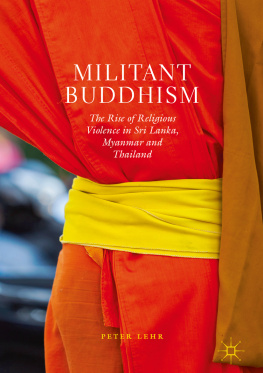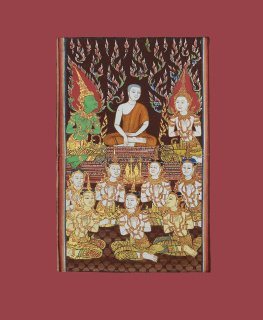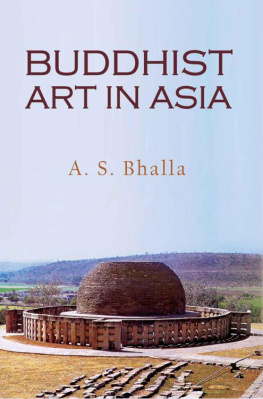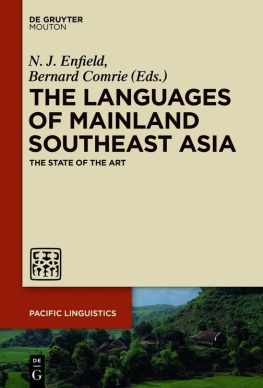COLD WAR MONKS
Cold War Monks
Buddhism and Americas Secret Strategy in Southeast Asia
EUGENE FORD
Yale
UNIVERSITY PRESS
NEW HAVEN AND LONDON
Published with assistance from the Kingsley Trust Association Publication Fund established by the Scroll and Key Society of Yale College and with assistance from the Louis Stern Memorial Fund.
Copyright 2017 by Yale University.
All rights reserved.
This book may not be reproduced, in whole or in part, including illustrations, in any form (beyond that copying permitted by Sections 107 and 108 of the U.S. Copyright Law and except by reviewers for the public press), without written permission from the publishers.
Yale University Press books may be purchased in quantity for educational, business, or promotional use. For information, please e-mail (U.K. office).
Set in Electra LH type by Newgen North America.
Printed in the United States of America.
Library of Congress Control Number: 2017936594
ISBN 978-0-300-21856-5 (hardcover : alk. paper)
A catalogue record for this book is available from the British Library.
This paper meets the requirements of ANSI/NISO Z39.48-1992 (Permanence of Paper).
10 9 8 7 6 5 4 3 2 1
For my mother and father
CONTENTS
ACKNOWLEDGMENTS
For financial support during my dissertation phase, Im grateful to the Advanced Studies in Thai program at Chiang Mai University and to the Yale Council on Southeast Asian Studies, which gave me two small but critical grants to help fund my research in Thailand and the United States. The Yale Graduate Schools dissertation write-up fellowship was another important source of funding that allowed me to proceed when other options fell through. The National Research Council of Thailand graciously handled my application to begin my work.
In Thailand, I was fortunate to form a circle of colleagues and friends who were a source of good practical advice as well as good cheer. Im grateful to Chalong Soontravanich for his mentorship and for his patient assistance with a difficult visa issue. I also recall with gratitude the helpfulness and hospitality of Puangthong Rungswasdisab Pawakapan and Niti Pawakapan. It was Puangthong who, in turn, introduced me to Kamoltip (Tip) Changkamol, my intrepid research assistant, whose competence I came to greatly respect and rely on. Tip transformed what might have been a lonely enterprise into a more enjoyable, shared undertaking in investigative history. I must also thank Jumana Dalal, Sinit Deesomsuk, Skylar Sukapornchai, and Mark Harris for making Bangkok seem, at times, almost like home.
Im grateful to Mahachulalongkorn University, where I received a warm welcome from Phra Suthithammanuwat (Tiab Malai), Dean of the Faculty of Buddhism, and formed a connection with Dr. Athithep Phatha. I benefited considerably from Dr. Phathas advice and help, which even included accompanying me on a series of oral interviews in northeastern Thailand and Laos and hosting me at his family home in Nakhon Phanom.
Im indebted to William Klausner for all that he has done to make this project possible during its long gestation. Though he was certainly under no obligation to do so, Bill took me into his confidence and treated me with great kindness while researching in Bangkok and during the entire writing phase.
Along the wayin Bangkok and beyondIve benefited from conversations and exchanges with colleagues and mentors who have taken time away from their own busy schedules to share ideas and respond to questions, provide feedback on early drafts, or help in other ways. Id especially like to thank Ian Baird, Barnett Baron, Boonpisit Srihong, John Brandon, Jim Chamberlain, Patrick Cohrs, Kate Doyle, Seth Fein, Daniel Fineman, Glenda Gilmore, Christopher Goscha, Denis Gray, Tyrell Haberkorn, Paul Handley, Kevin Hewison, Patrick Jory, Charles Keyes, Kraisak Choonhavan, David Langbart, Samson Lim, Mary Lui, Mike Montesano, Matthew Phillips, Craig Reynolds, Richard Ruth, James Scott, Somboon Suksamran, Somparn Promta, Sulak Sivaraksa, David Steinberg, and Dr. Udon Chantawan. None of them, however, should be held responsible for any views expressed in this book or for any errors remaining in it.
In New Haven, I was thankful for the comradeship of Haydon Cherry, Kevin Fogg, Charles Keith, Kevin Ko, ShawnaKim Lowey-Ball, Malcolm McLean, and Brian Turner, as well as the administrative help of Kris Mooseker and Marcy Kaufman. Quang Phu Vans help allowed me to make use of an important Vietnamese-language source.
Rich Richie and Roongtiwa Harlow of the Southeast Asia Collection at Yales Sterling Memorial Library made time for me in their office on a regular basis as I was in the throes of writing. This not only lifted my spirits, but gave me an invaluable source of help. Roongtiwa (Na Maam) advised me on a number of difficult translations and alerted me to new sources held at Sterling. To her I owe a special thanks. My editors at Yale University Press, Chris Rogers, Laura Davulis, and Heather Gold, production editor Mary Pasti, and freelance copyeditor Glenn Perkins have all been very supportive. Bill Nelson prepared the useful map.
Friendships, old and new, have provided much needed moral support and sometimes even more greatly needed diversions. Id like to thank Todd Aydelott, Matthew Baker, Aaron Berns, Dominik Bartmanski, Margaret Carmalt, Avik Chatterjee, Daniel and Meagan Colvard, Paul Francke, Marc Hammond, Jean-Michel Hannecart, Ed Hershey, Adam Hill, Nathan Katzin, Scott Kaufman, Rishi Kotiya, Markus Labude, Russell Lacy, Christian Lentz, Jocelyn Olcott, Taryn Patterson, Elliot Paul, Richard Payne, Chris Perricone, Morgan Poulizac, Olivier Ruchet, Paul Schuler, Antonis Stampoulis, David Telfer, Sam Vong, Ethelbert Williams, Natasha Wunsch, and Qiangqiang (Philip) Zhang. Spencer and Stephanie (Baby) Cryder have stuck by me through thick and thinand across two continents; their confidence in me has helped sustain this project from the beginning.
Most of all, Id like to thank my former adviser, Ben Kiernan, for his wisdom and attentiveness over the years. In his generous way, Ben has always pushed me to do my best, putting wind in my sails whenever I felt dead in the water. Bens impressive knowledge of Asian and global history is a tremendous asset for his students. Despite his many responsibilities, he has always made time for me, helping me work through conceptual puzzles while providing countless thoughtful comments on drafts. He has made direct and vital contributions to my work. I reflect on all that he has done with great appreciation.
Thanks to my familyTristram, Amy, Abigail, Nolan, Gavin, Leah, Eli, Misha, Valery, Al, Sue, and Cathythe loved ones who form the core of my life and who encouraged me throughout. And, finally, Id like to express deepest gratitude to my parents, Steven and Jeanne, to whom this work is dedicated. Through their love and support, and by instilling in me a respect for knowledge and a love of the written word, they allowed me to see the value in finishing a project I might otherwise have abandonedand most likely would never have even begun.
COLD WAR MONKS
Introduction
Only determined foreign travelers manage to visit the reclining Buddhas of Phu Po hill. A motorcycle taxi from the city of Sahatsakhan is one way to reach this remote site in Thailands northeastern Kalasin province, a region of dinosaur bones, parched rice fields, and the shrines of an ancient religion that remains vibrant and consequential today.
Two Buddhas are carved on the sacred hill, both sheltered under naturally formed rock canopies. Visitors who climb to a shaded hilltop may then descend to the first overhang. Here they find a Buddha, five meters long, resting on his right side, sculpted into the rock face. The arch of the eyebrows suggests influences from Thailands Sukhothai period, dating from perhaps the thirteenth century.
Next page

